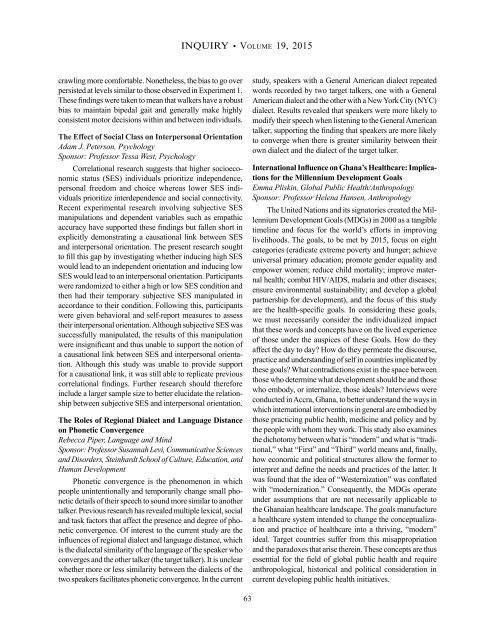INQUIRY
InquiryXIX
InquiryXIX
Create successful ePaper yourself
Turn your PDF publications into a flip-book with our unique Google optimized e-Paper software.
<strong>INQUIRY</strong> • Volume 19, 2015<br />
crawling more comfortable. Nonetheless, the bias to go over<br />
persisted at levels similar to those observed in Experiment 1.<br />
These findings were taken to mean that walkers have a robust<br />
bias to maintain bipedal gait and generally make highly<br />
consistent motor decisions within and between individuals.<br />
The Effect of Social Class on Interpersonal Orientation<br />
Adam J. Peterson, Psychology<br />
Sponsor: Professor Tessa West, Psychology<br />
Correlational research suggests that higher socioeconomic<br />
status (SES) individuals prioritize independence,<br />
personal freedom and choice whereas lower SES individuals<br />
prioritize interdependence and social connectivity.<br />
Recent experimental research involving subjective SES<br />
manipulations and dependent variables such as empathic<br />
accuracy have supported these findings but fallen short in<br />
explicitly demonstrating a causational link between SES<br />
and interpersonal orientation. The present research sought<br />
to fill this gap by investigating whether inducing high SES<br />
would lead to an independent orientation and inducing low<br />
SES would lead to an interpersonal orientation. Participants<br />
were randomized to either a high or low SES condition and<br />
then had their temporary subjective SES manipulated in<br />
accordance to their condition. Following this, participants<br />
were given behavioral and self-report measures to assess<br />
their interpersonal orientation. Although subjective SES was<br />
successfully manipulated, the results of this manipulation<br />
were insignificant and thus unable to support the notion of<br />
a causational link between SES and interpersonal orientation.<br />
Although this study was unable to provide support<br />
for a causational link, it was still able to replicate previous<br />
correlational findings. Further research should therefore<br />
include a larger sample size to better elucidate the relationship<br />
between subjective SES and interpersonal orientation.<br />
The Roles of Regional Dialect and Language Distance<br />
on Phonetic Convergence<br />
Rebecca Piper, Language and Mind<br />
Sponsor: Professor Susannah Levi, Communicative Sciences<br />
and Disorders, Steinhardt School of Culture, Education, and<br />
Human Development<br />
Phonetic convergence is the phenomenon in which<br />
people unintentionally and temporarily change small phonetic<br />
details of their speech to sound more similar to another<br />
talker. Previous research has revealed multiple lexical, social<br />
and task factors that affect the presence and degree of phonetic<br />
convergence. Of interest to the current study are the<br />
influences of regional dialect and language distance, which<br />
is the dialectal similarity of the language of the speaker who<br />
converges and the other talker (the target talker). It is unclear<br />
whether more or less similarity between the dialects of the<br />
two speakers facilitates phonetic convergence. In the current<br />
study, speakers with a General American dialect repeated<br />
words recorded by two target talkers, one with a General<br />
American dialect and the other with a New York City (NYC)<br />
dialect. Results revealed that speakers were more likely to<br />
modify their speech when listening to the General American<br />
talker, supporting the finding that speakers are more likely<br />
to converge when there is greater similarity between their<br />
own dialect and the dialect of the target talker.<br />
International Influence on Ghana’s Healthcare: Implications<br />
for the Millennium Development Goals<br />
Emma Pliskin, Global Public Health/Anthropology<br />
Sponsor: Professor Helena Hansen, Anthropology<br />
The United Nations and its signatories created the Millennium<br />
Development Goals (MDGs) in 2000 as a tangible<br />
timeline and focus for the world’s efforts in improving<br />
livelihoods. The goals, to be met by 2015, focus on eight<br />
categories (eradicate extreme poverty and hunger; achieve<br />
universal primary education; promote gender equality and<br />
empower women; reduce child mortality; improve maternal<br />
health; combat HIV/AIDS, malaria and other diseases;<br />
ensure environmental sustainability; and develop a global<br />
partnership for development), and the focus of this study<br />
are the health-specific goals. In considering these goals,<br />
we must necessarily consider the individualized impact<br />
that these words and concepts have on the lived experience<br />
of those under the auspices of these Goals. How do they<br />
affect the day to day? How do they permeate the discourse,<br />
practice and understanding of self in countries implicated by<br />
these goals? What contradictions exist in the space between<br />
those who determine what development should be and those<br />
who embody, or internalize, those ideals? Interviews were<br />
conducted in Accra, Ghana, to better understand the ways in<br />
which international interventions in general are embodied by<br />
those practicing public health, medicine and policy and by<br />
the people with whom they work. This study also examines<br />
the dichotomy between what is “modern” and what is “traditional,”<br />
what “First” and “Third” world means and, finally,<br />
how economic and political structures allow the former to<br />
interpret and define the needs and practices of the latter. It<br />
was found that the idea of “Westernization” was conflated<br />
with “modernization.” Consequently, the MDGs operate<br />
under assumptions that are not necessarily applicable to<br />
the Ghanaian healthcare landscape. The goals manufacture<br />
a healthcare system intended to change the conceptualization<br />
and practice of healthcare into a thriving, “modern”<br />
ideal. Target countries suffer from this misappropriation<br />
and the paradoxes that arise therein. These concepts are thus<br />
essential for the field of global public health and require<br />
anthropological, historical and political consideration in<br />
current developing public health initiatives.<br />
63


